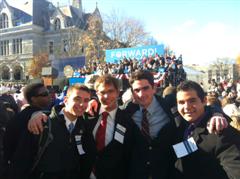
Everyone knows that President Obama won the 2012 election. The question people are turning to now is how. Faculty and staff in the Politics department have different takes on how the Democrats managed to take the presidency, particularly here in New Hampshire.
According to Professor Chris Galdieri, politics, the GOP was unsuccessful in reevaluating their party’s platform issues after the primary, particularly regarding women’s issues.
He says, “They tried at the convention this year with Ann Romney’s speech. Susana Martinez [current governor of New Mexico] had a good convention speech. Kelly Ayotte was a prominent surrogate for the campaign.”
Professor Lucas, politics, adds that the gender gap always plays a role in the election saying, “In general, one source of the gender gap is that on average women prioritize social issues (poverty, education, health, reproductive issues) higher than men, and Democrats tend to be viewed as the party that is more likely to address those issues.”
Lucas continues, “President Obama had a similar gender gap as he did in 2008, so I’m not sure ads really made much of a difference.”
Galdieri agreed with that saying, “They [the ads focusing on women’s issues] had an impact, but not huge.”
Regarding New Hampshire, however, Neil Levesque believes women’s issues played a decisive role in both the presidential and gubernatorial races.
“The Democrats made abortion a wedge-issue,” he says.
The President’s victory in New Hampshire was a shock for many. Mitt Romney, the Republican challenger, seemed to have a strong ground game in the state. His rally the night before election night had about 10,000 people.
Levesque believes the state’s low unemployment rate was partially to blame for Romney’s economically centered message falling short in New Hampshire.
“Romney’s focus on the economy didn’t ring as true here with our unemployment between 5.1 and 5.7 percent,” said Levesque.
Galdieri added that Romney’s ground game was not consistently strong.
“They had a strong presence during the primary, but then they packed up and left until the summer,” said the politics professor.
Galdieri says the Obama campaign had a strong presence throughout, and continued to have a strong organization even with nothing at stake during the primary.
“The Romney campaign was out muscled,” he says.
Levesque says it’s more about personality in New Hampshire than ground game this time around.
“The [Romney] message didn’t get through to voters. A lot of it has to do with personality and the people they can identify with, or think is on their side. It’s a strong mentality like Red Sox or Yankees,” he says.
Same-day voter registration was also a factor many people cited as a potential problem for the Romney campaign. Although no voter fraud has been formally filed due to same-day registration, there have been rumors that some same-day voters are from more Democratically-minded neighboring states such as Massachusetts and Vermont and are not actually New Hampshire residents. They come and vote that day and sway the election.
Lucas says, “There were reports of long lines for same day registration, but it might very well be linked to the GOTV efforts in the state, an organization for which has been in place since the last election.”
Galdieri says he has not heard of any same-day registration fraud, “I am actually a fan of same-day registration. Same-day registration states have some of the highest levels of voter turnout and civic participation.”
Political pundits are already looking toward 2016, which means open spots in both parties. Taking the lessons learned from 2012, both parties have certain changes they need to make to keep up with a changing electorate. To faculty and staff at Saint Anselm, the end of the 2012 election signals the beginning of another round of contenders for the college to play host to.

